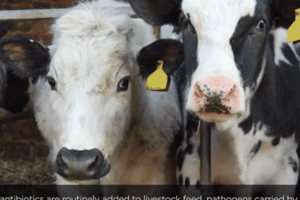
Researchers are Beginning to See MRSA in Animals. Researchers are beginning to see MRSA in family pets, which has slowed healing in some MRSA-afflicted pet owners. Suspicions about animal-to-human MRSA transmission are being raised this week in the New England Journal of Medicine. Methicillin-resistant Staphylococcus aureus is a mutated form of staph called MRSA that, when not […]

Researchers are Beginning to See MRSA in Animals. Researchers are beginning to see MRSA in family pets, which has slowed healing in some MRSA-afflicted pet owners. Suspicions about animal-to-human MRSA transmission are being raised this week in the New England Journal of Medicine. Methicillin-resistant Staphylococcus aureus is a mutated form of staph called MRSA that, when not treated early, is resistant to all but the one antibiotic of last resort.
German scientists reported one woman endured a series of nasty abscesses caused by MRSA, until a veterinarian screened and treated the family cat for the same infection. Researchers in the U.S. and Canada are also studying the connection between pets, people, and MRSA, which has been linked to over 94,000 infections and nearly 19,000 US deaths in 2005. “We’ve found MRSA in dogs, cats, rabbits, pigs—even marine mammals,” said J. Scott Weese, an associate professor of pathobiology at the University of Guelph in Ontario, Canada. Horses and cows are also routinely affected. Pet owners should be aware, but not worried, about the potential of MRSA transmission from their pets, said Weese, who is part of a team led by researchers at the University of Missouri, Columbia studying MRSA prevalence in humans and companion animals. “The big thing we need to get the mindset around is that we’re not a population of dogs, cats, and people; we’re a population of animals,” said Weese.
The question scientists are looking to answer is whether people and pets swap the MRSA germs, creating a continuous infection-re-infection loop. Humans and pets can be colonized with the MRSA bacteria, said John R. Middleton, an associate professor of food animal medicine and surgery at the University of Missouri. Which means they may not have active infections, but are carriers. An ongoing study of some 600 US people-pet households revealed that staph aureus germs were present in nearly 28 percent of people and 13 percent of pets; about 10 percent of households had both a human and an animal colonized. MRSA was detected in over five percent of humans and about three percent of dogs and cats.
What remains unclear is who transmits the infection first. One theory being considered is pets may pick up the bacteria from people and then serve as reservoirs, harboring the infection and re-infecting humans. “Pets could be innocent bystanders, or they could be significant sources of infection,” Weese said. “They’re probably somewhere in between,” he added
Often, the cycle is not serious; most infections are minor lesions cured quickly with proper hygiene and secure bandages. The bacteria become dangerous when it moves into the body, leading to bloodstream or surgical site infections or life-threatening pneumonia. In homes where people are suffering serial infections or surgical wounds that don’t heal, consider the non-human family members, scientists said. Most vets should be able to conduct the simple swab tests to determine whether a pet is colonized with MRSA, he added. It appears that animals will shed the bacteria on their own, Weese said, given enough time, good hygiene, and no re-infection by a human source. One effective cure for animals is a dose of antibiotic nasal cream.
The personal injury attorneys at Parker Waichman LLP offer free, no-obligation case evaluations. For more information, fill out our online contact form or call 1-800-YOURLAWYER (1-800-968-7529).


